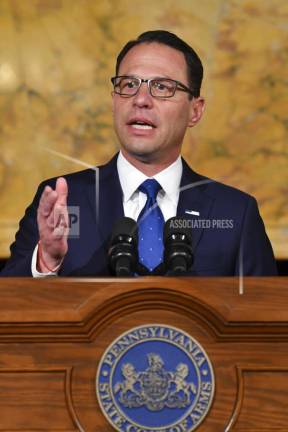Shapiro’s bipartisanship talk welcome in fight-weary Capitol
Pennsylvania. Among Governor-elect Josh Shapiro’s priorities are more money for public schools and raising the minimum wager to $15 an hour. Some of his policy interests coincide with Republicans’.

Democratic Gov.-elect Josh Shapiro will take office next month talking about how voters across the political spectrum in Pennsylvania gave him a mandate, a message he will carry into a state Capitol riven by partisanship and, recently, a breakdown in lawmaking.
Shapiro, the state’s two-term attorney general and a former state lawmaker and county commissioner, has possibly a better understanding than any recent predecessor about what it takes to get legislation through the nation’s largest full-time Legislature.
To a significant extent, Shapiro starts off in strong position: his fellow Democrats won the House, state coffers are flush with cash and his Republican opponent was weak, peddling far-right views that repelled donors and moderate voters.
Still, the state Senate remains firmly in Republican control, meaning that every new law must have a GOP stamp of approval. Now, five weeks into his transition, Shapiro is stressing bipartisanship, seeding his transition team with Republicans and avoiding radioactive political issues.
Speaking to an audience of political and social elite at the Pennsylvania Society dinner in New York, Shapiro framed his powerhouse 15-point win in the November election as a bipartisan victory.
``I want you to know that I’m mindful of something, mindful that we not only built a bipartisan coalition to win an election, but a bipartisan coalition to govern the commonwealth of Pennsylvania for all 13 million Pennsylvanians,`` Shapiro told the crowd.
Shapiro will enter a Capitol where his immediate predecessor, Democratic Gov. Tom Wolf, issued the most vetoes by any governor since the 1970s and opted for unilateral lawmaking through executive orders, regulations or agency actions to get around the Republican-controlled Legislature. Lawmakers acted similarly, pursuing lawmaking through constitutional amendments to get around Wolf’s veto pen.
Shapiro, on the campaign trail, distanced himself from such maneuvers, saying he’ll ``get the legislative process working again.’’
When he takes office Jan. 17, some of his top priorities will be familiar to Republicans from Wolf’s term in office.
Shapiro has talked of stepping up funding for chronically underfunded public schools _ a prospect that could mean asking lawmakers for billions more dollars _ and raising the state’s rock-bottom minimum wage to $15 an hour.
Still, Shapiro has worked to disarm Republicans, expressing support for policies more in their wheelhouse, such as cutting corporate income taxes, expanding taxpayer support for private and parochial schools and speeding up state permits for industrial and construction projects.
Shapiro’s rhetorical and political approach has, thus far, gotten noticed by Republicans.
In remarks at a state Republican Party luncheon earlier this month in New York, the Senate’s top Republican, Kim Ward of Westmoreland County, said she was optimistic about what could be accomplished. Shapiro, she told the crowd, has a number of priorities that appeal to Republicans.
The House’s top Republican, Bryan Cutler of Lancaster County, said there is a lot of consistency between the things Shapiro has talked about and what House Republicans have made their priorities.
``All those are priorities that we are absolutely willing to work on,’’ Cutler said in an interview.
In turn, Shapiro likely will ask Republicans to bend on what he wants.
As attorney general, Shapiro frequently sought lawmakers’ approval for his office’s priorities, with some wins _ and losses.
Lawmakers gave Shapiro more money to hire more agents and, following his office’s landmark grand jury report on coverups of child sexual abuse in Roman Catholic dioceses, agreed to expand statutes of limitation.
But Senate Republicans refused his entreaties to dissolve time limits in state law that bar now-adult victims from suing.
Meanwhile, lawmakers declined Shapiro’s efforts to expand his office’s authority to pursue gun-trafficking crimes across the state, a key element of how Shapiro wanted to fight gun violence.
In the Capitol, the main event every year is passing a budget and, in their first years, both Wolf and former Democratic Gov. Ed Rendell floated ambitious tax proposals that precipitated protracted budget fights with Republican-controlled legislatures.
For his part, Wolf downplays the idea that bipartisanship means harmony.
``I think there’s this tendency to talk about bipartisanship,`` Wolf said in an interview. ``But that’s not a democracy. Democracy is where you openly and proudly disagree with each other. And you argue it out. And sometimes you can come to an agreement and sometimes you can’t.’’
Wolf and Rendell have maintained that they got plenty done in office, despite difficult first years.
Still, some Democrats who are veterans of the Capitol say it will be important for Shapiro to avoid a divisive first budget proposal.
Scars from a protracted budget fight can last for years, they say.
For one thing, it can inflict political damage that is difficult to reverse in time for a reelection campaign. For another, it can sour opposition lawmakers on working with a governor on future endeavors.
Mark Singel, the former lieutenant governor under the late former Gov. Robert P. Casey, a Democrat, recalled going into a meeting with Senate Republican leaders to ``beg’’ for votes for a tax package that Casey floated after he won reelection on a platform of fiscal austerity.
It became difficult to get legislation through after that, Singel said.
``They weren’t going to let us forget it,’’ Singel said. ``They said, `count on this being a political issue for years’ and they meant it.``